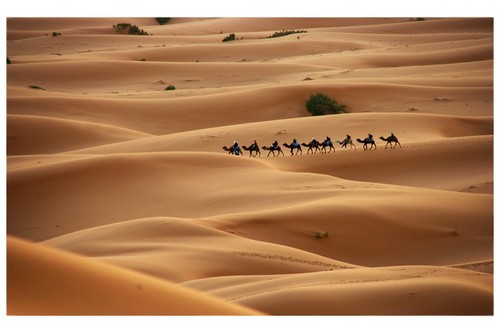This just in……
Several years ago I was invited to take over a course at New York University.
The man teaching it, Ed Diamond, had died just a few days before school was to start.
The name of the course was “Television and the Information Explosion”.
The core book for the course was called “Tube of Plenty”.
The premise of the course was that the advent of television (the really terribly named ‘tube of plenty’ book) was changing the world because it was exposing people to reams of information they had never seen before.
Now, some 10 years later, this seems almost funny.
Until now, we have lived not in an an ‘information explosion’, but rather in an information desert. The idea that a local news station such as WABC in New York could cover 12 million people with 11 camera crews each day and think of it as coverage shows the paucity of our experience with news.
CBS News which portends to ‘cover the world’ has a large bureau in London, a few folks in Jerusalem and one person in an apartment in Tokyo. That’s it. No one in China, no one in South America, no one in Mexico, no one in Africa, no one in India. It is a bit incomprehensible when you think about it.
This is not confined to television. The Boston Globe has just announced that they are closing all their foreign bureaus.
We have lived in an information desert for so long that we have come to accept this as a norm.
On Monday, The New York Times ran an OpEd piece by Michael O’Hanlon and Kenneth Pollack, from The Brookings Institute. They said that following an 8-day visit to Iraq, they thought the war situation was improving and might be winnable.
Late last night, I drove from New York to the Hamptons. In order to try and keep awake, I kept the radio on WABC Talkradio and was inundated with two and a half hours of non-stop rightwing blather, almost all of it related to the NY Times piece.
Now, this is the part I find the most interesting:
O’Hanlon and Pollack spent 8 days in Iraq to reach their conclusion. 8 days on a whirlwind tour. Maybe they are right. Maybe they are not. But I can tell you one thing I know for sure… it is shocking beyond words that anyone can believe they can know anything after 8 days! BUT… we live in a world of such limited content and news and journalism that we come to accept that an 8 day visit is an in-depth study. (Why don’t we do brain surgery with surgeons who have been to med school for 8 days?)
The ‘information desert’ makes one 8-day visit seem that it is indeed in-depth. Also there may be 13 million Iraqis who have spent 5 years in war torn Iraq; there likely are certainly a handful of westerners (if you don’t take the word of the in-house locals) who speak the language, live in the country and know the place.
But we don’t plug them into the ‘news system’. They are not allowed to participate. Too confusing? Too complicated? Too much information?
It is all out there.
Now, the web gives us an opportunity to tap into ‘real’ news and ‘real’ information.
One day, in the not too distant future, when we are all plugged into and participating in the great information matrix, we will look with bemused astonishment at what we once called news.

4 Comments
rosenblumtv August 02, 2007
No no….
It’s stereoscopic slides to television… but thanks for making the attempt.
$ August 02, 2007
I’ll go along with you on something.
I think comparing VJs to stereoscopic slides is right on target.
rosenblumtv August 01, 2007
Yes. The world changes mighty fast and what once seemed cutting edge can suddenly seem quaint and archaic. Did you know that when the first railways were built in the UK there was a school of medical science that held that people would die if they went faster thn 15 mph because they would not longer be able to breathe? Television certainly changed people’s view of the world, as did stereoscopic slides.. but times change fast. Monday’s cutting edge technology is tuesday’s quaint remnant of the past.
$ August 01, 2007
You are basing your views about a “television desert” on current realities and not those made at the time of that comment.
Television in fact did and does expand the world for many people. Long before the Internet.
Before television many more people were isolated. Their only outlet for outside views were radio and newspapers. No visuals. Television changed that and THAT is why the comment, made at that time, is valid.
For you to use that comment as a basis for your thoughts today is yet another example of your habit to compare apples with oranges in order to promote your own self interests.
No surprise.